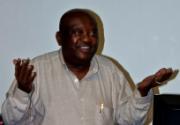
A society in which each one of us is our brother’s keeper; a society in which all are equal. This is how anti-apartheid activist Steve Biko foresaw a future South Africa, according to his close friend and fellow Black Consciousness Movement founder member, Dr Aubrey Mokope, who delivered his commemoration speech to mark the tragic death of Steve Biko in September 1977.
Dr Mokoape said the political elite of South Africa in post-apartheid South Africa has disallowed any such equality by alienating the masses from political participation and using the state as a vehicle for private plunder.
Dr Mokoape was the keynote speaker at a round table discussion at Rhodes University last week (Tuesday 18 September) entitled ‘Marx, Fanon and Biko: Touchstones in a time of crisis?’
The event was organised by the Unemployed People’s Movement (UPM) chairperson Mr Ayanda Kota. Other speakers included Fanon scholar Prof Nigel Gibson and Rhodes academic and public intellectual Mr Richard Pithouse. Dr Barney Pityana, also a founder member of the BCM, was unable to attend due to a last minute commitment.
Mr Pithouse mentioned the significance of honouring living activists like Dr Mokoape, and extended his thanks to Kota for opening the gates of the university, which he insists must be permeable.
Both Mr Pithouse and Dr Mokoape focussed on the Marikana massacre as a prime example of South Africa in crisis. Dr Mokoape believes it to be a prelude of what is to come in our country.
“As long as the status quo is maintained, Marikana will be repeated in various forms,” he said. He questioned the reasons for the massacre, as the miners “merely asked for R12 500 a month, a little more crumbs from the master’s table. Not the land, not the mines, not control over their labour. But they were demonised, told that they were ignorant and would scare off investors, those [same people] who made money in the Trans-Atlantic trade,”added Dr Mokoape.
But it is of those that are “given larger crumbs than the rest of us” that Dr Mokoape is particularly critical. He argued that the ‘Induna class’, as he calls the elite ruling the country, are entrenching the state instead of the people.
Mr Pithouse went further by quoting the trade union term ‘predatory elite’, which refers to a ruling class as not only authoritarian and rapacious, but one which unashamedly uses violence in order to protect itself.
“We need to be able to simultaneously criticise people in power uncompromisingly and criticise how our society retains colonial features,” said Mr Pithouse to an audience made up of students and members of the community alike.
“It is up to your generation to find ways of doing it at the intersection of the university and the world outside. If there is to be an electric shock, it will come out of that engagement,” he added.
How can lessons furthermore be drawn from the past? Are the ideas of philosophers such as Marks, Fanon and Biko still relevant? Mr Pithouse said that we can learn from them, but we can’t simply do what they did.
What we can learn, according to Prof Gibson, is that revolutionary ideas still matter. These ideas range from Fanon’s insistence on the importance of social consciousness in order for nationalism to be successful, Marx’s questioning of the exclusion of ordinary workers from the thinking space in society, and Biko’s grassroots approach to problems by teasing them out through dialogue.
Being critical of the government, or seeing the ‘uncoolness of cool’, as Dr Mokoape said, is therefore not enough. One of the greatest lessons learnt from the BCM is that you have to battle with your own reality and your own demons, insists Dr Mokoape.
“The journey to consciousness has no end. You cannot and should not say, “I’m conscious, and it’s all over.” He stressed the necessity of enriching theory through practice, and more particularly, praxis. He used the example of how BCM students in Durban in the 70s engaged with shack dwellers. He said that this was not about students taking ideas to the poor but about conversations in which there was mutual learning.
During a prolonged question time, many thought-provoking ideas were shared and questions raised. One audience member queried the reception of Biko’s politics of consciousness by people whose main concern is hunger. Gibson was certain that people who are struggling around basic needs can also be open to discussing ideas.
Both Dr Mokoape and Mr Pithouse mentioned the danger of dogmatising concepts such as Marxism and black consciousness and the need for us to engage in perpetual dialogue made up of living thought. “The people have the solution,” insisted Dr Mokoape, “They may not be able to articulate it, but they know what they want.”
Dr Mokoape’s final words were particularly striking, and concluded an evening that planted many seeds for self-reflection. “It is your duty to see where you stand in relation to people who are exploited and suffer the indignities… if anything goes wrong in your presence, you share that guilt. Don’t feel that privilege protects you.”
Photo and story by Ruth Woudstra
Photo: Former Pan African Congress leader and Black Consciousness Movement founder member Dr Aubrey Mokoape.
